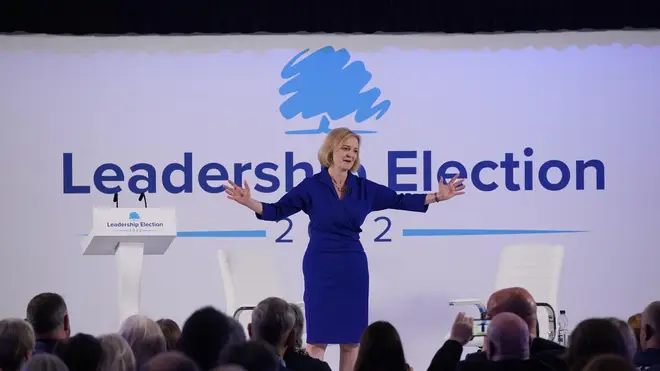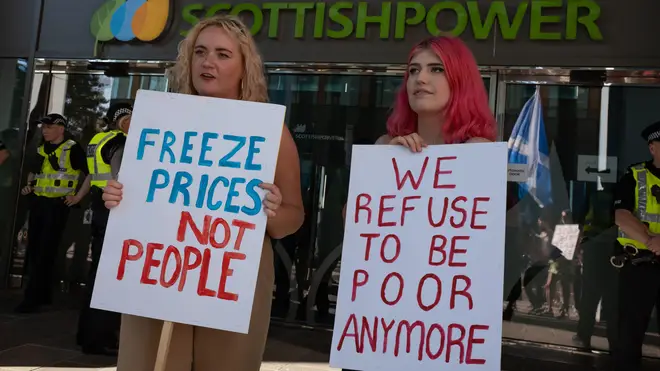
Oli Dugmore 4am - 7am
26 August 2022, 00:13 | Updated: 26 August 2022, 00:16

Britain's next Prime Minister is set to unveil financial help for struggling households within days of beginning their premiership, as another hike to the energy price cap looms.
Chancellor Nadhim Zahawi will reportedly say new measures will be announced "as soon as possible" after the new Tory leader is announced on September 5.
The Telegraph reports Mr Zahawi has been "working flat out" to come up with a plan to tackle the cost of living crisis - in particular soaring energy bills.
A Treasury source told the paper it means Britain's next Prime Minister can "hit the ground running" and quickly deliver help to struggling families.
And Liz Truss has pledged to use an emergency budget in September to "ensure support is on its way to get through these tough times", according to the Daily Mail.
Read more: Cost of living: Energy bills set to cost more than some mortgages, experts predict
Read more: Minister pledges 'further package of support measures' for Brits struggling with cost of living
It comes hours before Ofgem, the UK energy industry regulator, is due to make its latest announcement regarding the energy price cap.
Around 24 million households are set to be told that their energy bills will rise by around 80 per cent from the start of October.
The average household will pay somewhere between £3,550 to £3,600 according to predictions from consultancies Cornwall Insight and Auxilione.
This is approximately £2,300 more than a year earlier.

As they wait for Government help, many will try to reduce bills by keeping their homes colder, cooking in bulk and taking shorter and less regular showers.
Experts also say that turning down the flow temperature on your boiler and switching off your boiler's pre-heat mode can save hundreds of pounds this winter.
But such savings are likely to offset only a small proportion of the mammoth price cap.
Families will have to come up with the money somehow, or face winter living in the cold. Around 45 million people in the UK could be thrown into fuel poverty as a result, according to a study from the University of York.
Rocio Concha, the director of policy and advocacy for Which?, said that six in 10 households are cutting back on essentials or dipping into savings, even ahead of the bill rises.
It "reinforces the need to urgently deal with this crisis before many more families are pushed into the difficult choice between heating or eating", she said.
"The Government must move quickly to increase the amount of financial support it is providing to help households make ends meet and work with businesses to look at what more they can do for those facing serious financial hardship."

Mr Sunak and Ms Truss have different plans to tackle the cost of living.
Frontrunner Ms Truss has said that she might remove the £400 support from higher earning households.
She has also hinted at removing the existing windfall tax on energy firms, which was introduced in May by her rival, Rishi Sunak.
She insists that National Insurance tax cuts can help, and promised to ensure the UK starts producing more North Sea energy.
She has also promised to slash green levies on energy bills, and hinted at targeted support for the most vulnerable households.
But Mr Sunak has said that her plans will tip millions into destitution, and her pledge to cut National Insurance payments will save people £1 a week and do nothing for households.
The former chancellor has announced an extra £10 billion to help people with their bills.
A Sunak government would temporarily scrap VAT payments on domestic fuel use, taking £200 off the average bill, while it would funnel an extra £5 billion to the most vulnerable.
However, Labour says this is not enough to cover the massive rises. Both Labour and the Liberal Democrats have called for a price freeze at just under £2,000.
Several energy companies have suggested similar ideas - using bank loans to keep the cap at current levels.

'The utility companies are absolutely taking the mick out of us all.'
Outgoing Prime Minister Boris Johnson has blamed the war in Ukraine for the soaring energy crisis.
On Wednesday, during a visit to Kyiv, he said Brits must endure the high costs as the "price" for freedom in Europe.
"We know that if we’re paying in our energy bills for the evils of Vladimir Putin, the people of Ukraine are paying in their blood," Mr Johnson said.
Read more: British Gas to give 10% of profits to poorest customers after fury at bumper earnings
But a new poll has suggested almost half of Britons blame the energy crisis on the government.
Research by Focaldata of 1,021 adults from across the UK showed that 47 per cent of respondents blame ministers for "failing to prepare and prevent" the huge rise in energy bills.
Just under a third - 30 per cent - condemn the energy firms.
The polling, on behalf of Cavendish Advocacy and collected on August 17-18, also shows 92 per cent of people who took part are "concerned" about the energy crisis.
Two thirds said they were "very concerned".
The survey also found 20 per cent of those interviewed would be prepared to pay more for their gas and electricity bills, but only if the money was used to invest in better infrastructure to prevent potential blackouts or gas supply issues.

Tom Bradley, head of energy & green growth at Cavendish Advocacy, said: "Our research confirms the level of concern amongst people across the UK at the rising cost of energy, and the situation is expected to get worse when Ofgem announces its latest price cap this week.
"The debate has moved on as to how the country has reached a critical point where energy bills may top more than £3,500 a year.
"Our polling shows that the public expects both politicians and the energy industry to take responsibility and bring more stability and affordability to the market.
Read more: Minister pledges 'further package of support measures' for Brits struggling with cost of living
"Surprisingly, almost a fifth of UK adults are willing to pay more if the money was invested in better infrastructure to prevent potential blackouts or gas supply issues.
"The cost of living is the core issue dominating our politics right now, and that is being driven by soaring energy prices. The public will be looking on with much interest on Friday as to what politicians and the industry do next to try and mitigate this energy crisis."